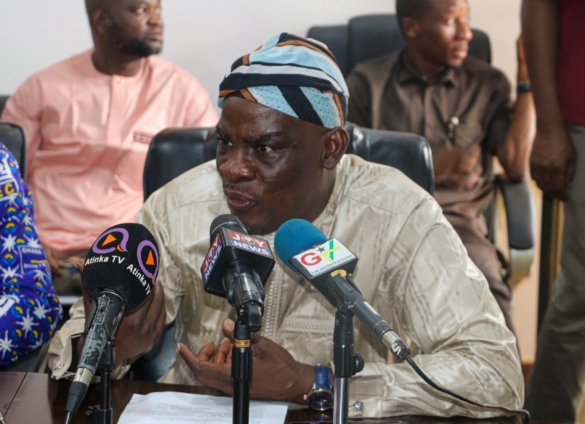
Audio By Carbonatix
Minister of Education Haruna Iddrisu has unveiled plans to embed Artificial Intelligence (AI), coding, robotics, and electronics as integral components of the nation's educational curriculum, starting from the basic level.
The Minister made these remarks during a courtesy visit to Wisconsin International University College, where he also announced a significant extension to the deadline for private universities to obtain their Presidential Charters.
During his visit, Mr Iddrisu also commended the university as one of Ghana's "flagship tertiary institutions."
"I had a tour of the institution. I'm impressed, particularly with the AI laboratory. But my joy was at the anatomy laboratory where the young lady took us through what happens there," Minister Iddrisu stated, acknowledging the university's innovative strides.
AI, robotics, and digital literacy from early stages:
Looking ahead, Minister Iddrisu outlined the government's vision for a digitally empowered Ghanaian populace.
"We are currently reviewing a curricula for pre-tertiary education and I'm happy to say that AI, coding, robotics and electronics will become an integral part of the early formative training of Ghanaian people," he announced.
This means that "from pre-tertiary level, the government intends to introduce and roll out, in addition to reviewing and having a digital education policy, that would ensure that every child at least gets an exposure to AI, coding, electronics and robotics."
This bold initiative aims to equip Ghanaian students with crucial 21st-century skills from a young age, preparing them for a rapidly evolving global economy driven by technology.
This move aligns with global trends in education, where countries like Estonia, Finland, and Singapore have already integrated coding and computational thinking into their primary and secondary school curricula.
Ghana's commitment to this early exposure reflects a strategic effort to bridge the digital divide and foster a generation proficient in emerging technologies, essential for the nation's digital transformation agenda, as outlined in the National Digital Economy Policy.
Charter deadline extended to protect investments
On the contentious issue of Presidential Charters for private universities, Mr Iddrisu announced a crucial policy adjustment.
Recognising the pivotal role that institutions such as Wisconsin play in the provision of higher education, he revealed, "I've requested that we extend the charter period... at least for not later than the next 10 years."
This extension comes as significant relief to many private universities that have voiced concerns about the original strict timelines, which they argued were unrealistic due to infrastructure and faculty development challenges.
The current policy requires private universities to obtain a Presidential Charter within 10 years of their establishment or risk closure.
The minister explained the rationale behind the extension.
"That's enough room for you to build faculty, enough room for you to improve your infrastructure, both academic and residential, learning, and other resources."
However, he made it clear that this extension is not indefinite.
"It cannot continue forever and ever that you haven't chartered. So we'll give you an opportunity in the next couple of years to get yourself ready. So the government is happy to do so in order that we can secure and protect your investment."
He advocated for the charter process to be optional. Minister Iddrisu's announcement, while not making it optional, provides a much-needed reprieve, acknowledging the "major risk" private institutions undertake in investing in higher education.
Latest Stories
-
Interior Ministry extends aptitude test dates for WASSCE applicants in 2025/26 security services recruitment
13 minutes -
National Investment Bank donates GH₵1m to support GAF barracks redevelopment project
44 minutes -
Gomoa-East demolition: 14 suspects remanded by Kasoa Ofaakor Court
2 hours -
Divers recover bodies of seven Chinese tourists from bottom of Lake Baikal
3 hours -
From windstorm to resilience: How Wa school is growing climate protection
3 hours -
Reclaiming the Garden City: Dr. Kwame Adinkrah urges Kumasi to rein in billboard proliferation
4 hours -
Bursar of Ghanata SHS arrested for alleged diversion of student food supplies
4 hours -
Trump says he will increase global tariffs to 15%
4 hours -
Bogoso-Prestea mine records first gold pour after 24-month shutdown
4 hours -
Ghana–ECOWAS talks end with renewed push for women and youth political inclusion
5 hours -
Interior Minister receives Hudai Foundation food donation for prison inmates during Ramadan
5 hours -
UBIDS to benefit from pre-fabricated US$6.6m 1k capacity classroom project
5 hours -
Interior Minister launches Automated Fire Safety Compliance System to enhance public safety
5 hours -
Africa must lead climate intervention conversation – Experts
5 hours -
Ghana hosts high-level ECOWAS meeting to boost women and youth political participation
6 hours

